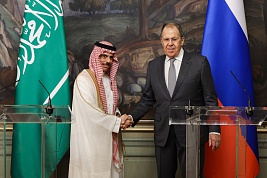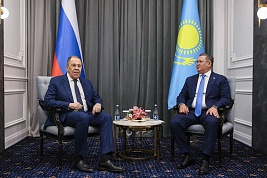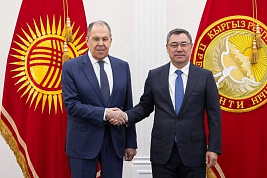Official Representative of the President and Foreign Minister Sergey Lavrov’s remarks at a plenary meeting of the Federation Council of the Federal Assembly of the Russian Federation on the approval of the laws ratifying treaties between the Russian Federation and the Donetsk and Lugansk people’s republics and the Zaporozhye and Kherson regions and establishing new constituent entities of the Russian Federation, Moscow, October 4, 2022
Ms Matviyenko,
Senators,
As per the instructions of President of the Russian Federation Vladimir Putin, I submit for your consideration the federal laws on the ratification of treaties between the Russian Federation and the Donetsk People’s Republic, Lugansk People’s Republic, Zaporozhye Region and Kherson Region on their accession to the Russian Federation and on the establishment of new constituent entities of the Russian Federation.
You know the contents of these draft laws very well. During their drafting, the President of Russia held the necessary consultations, including with the Federation Council. The Constitutional Court of the Russian Federation issued its opinion the day before yesterday. The State Duma ratified the laws yesterday.
These documents clearly set out the procedure for the integration of four independent states into Russia and guarantee the rights of their people as citizens of the Russian Federation in all areas, including language, culture, traditions, social protection and economic development.
The decisions on the integration of the Donetsk and Lugansk people’s republics and the Zaporozhye and Kherson regions into the Russian Federation are based on the free expression of will by their people made during the referendums on September 23-27, 2022. The people of these territories were able to express their will independently and freely, which has been confirmed by numerous observers, including international ones. The citizens of these republics and regions made a conscious choice based on the right to self-determination.
This is fully in keeping with the principle of equality and self-determination enshrined in the UN Charter, the 1970 Declaration On Principles of International Law concerning Friendly Relations and Cooperation among States in accordance with the Charter of the United Nations and many other documents. The abovementioned Declaration, which was unanimously adopted at the UN General Assembly, reads: “Every State has the duty to refrain from any forcible action that deprives peoples … of their right to self-determination and freedom and independence.” In accordance with the Declaration, peoples can resist such forcible action and are entitled to seek and receive the support of the international community. A great deal is being said today publicly that the principle of territorial integrity, also enshrined in the UN Charter, has an absolute priority over the right to self-determination. In this connection, I would like to draw the attention of those who may be interested that the Declaration of the UN General Assembly (1970) contains a clear answer to the proponents of this view. The Declaration seals the duty of states to respect the territorial integrity of states “conducting themselves in compliance with the principle of equal rights and self-determination of peoples… and thus possessed of a government representing the whole people belonging to the territory.”
There is no need to prove that the Kiev regime does not meet the said criteria and has for years grossly and massively violated the abovementioned UN requirements. It has long become something foreign and hostile to all residents of Ukraine, who cannot imagine living their lives without feeling part of the Russian civilisation and whom President Zelensky urged to “beat it to Russia” a year ago. It is utterly clear that this regime does not and cannot represent millions of citizens against whom it has unleashed a war.
The radical nationalists who seized power in Ukraine following a government coup in February 2014 have conducted a policy of suppression with regard to Ukraine’s Russians and Russian speakers throughout the subsequent period. They have branded as terrorists the residents of the Donetsk and Lugansk regions, who refused to recognise the criminal Maidan authorities. The Armed Forces of Ukraine and neo-Nazi battalions were taking cruel vengeance on the people of Donbass by shelling their cities and villages practically every day, killing and crippling people, destroying civilian infrastructure, and trying to stifle them with an inhuman blockade. Kiev openly derailed the Minsk Agreements as approved by the UN Security Council, and was not held accountable for this. In the meantime, the West was cynically looking the other way as if not noticing the Ukrainian radicals’ actions meant to solve the “problem of Donbass” by force – Plan B, as they called it. Moreover, the West was actually encouraging them to implement this scenario. In his speech in the Kremlin on September 30, President of Russia Vladimir Putin described in detail the true intentions harboured by the United States and its satellites with regard to using the Zelensky regime to wage war against Russia.
Ukraine itself has in fact turned into an aggressive totalitarian state that approves discriminatory laws, carries out forced Ukrainisation, encourages Russophobia, and violates language, educational, cultural and other human rights on a large scale. Supported by the authorities, the Ukrainian legislature adopts laws disseminating the ideology of Nazism and ethnic and religious intolerance. Ukrainian officials are no longer ashamed of their neo-Nazi essence and openly urge all and sundry to kill Russians the world over.
Russia could not but come to the rescue of the long-suffering people of Donbass. Nor can it fail to defend the residents of the Zaporozhye and Kherson regions from this inhuman regime.
The decisions taken at the referendums in the two republics and the two regions are a response to neo-Nazi Ukraine’s atrocities and the fulfilment of the people’s long-standing aspiration to reunite with their historical homeland.
On behalf of the President of the Russian Federation, I ask the Federation Council to approve the abovementioned laws.


